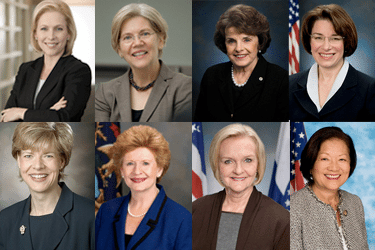ELECTION 2012: With Historic Number of Women, Senate Will Look a Little Bit More Like America
Next year will have an historic number of female senators, and that could be very good for women.

Update: Rick Berg has conceded, making it 20 women in senate.
It looks like we finnaly have ourselves a true “year of the woman” as the 2012 election draws to a close. An historic 19 female senators will be sworn in this January—20 if Rick Berg of North Dakota finally concedes—many of them supporting women’s issues like the right to choose, access to health care, affordable contraception, pay equity, and paid parental leave.
On the surface, the control of the senate doesn’t seem much changed. After all, Democrats lost the Nebraska seat, but gained seats in Massachusetts and Indiana, leaving the map mostly untouched. But a closer look shows that it was a clear win for women, both as politicians and as voters, based on final results.
Nebraska was the sole GOP pickup, with state Senator Deb Fischer beating Sen. Bob Kerrey. However, Fischer, an extreme anti-choice “no exceptions” politician is replacing Democrat Ben Nelson, who was also anti-choice for all practical purposes, and who had to be courted vigorously into a final vote yea with his party on the Affordable Care Act. We can expect Fischer, whose win was one of the few highlights from an otherwise dismal night for the national GOP, to be quickly embraced as a rising star in the senate, and likely the face of any continuing opposition to Obamacare in that chamber. Fischer was the only female Republican to win her senate race.
Democratic female senators had much better results. Every female incumbent Democrat won reelection, including Claire McCaskill of Missouri, who was expected to be the most vulnerable senator in the 2012 cycle. Senator Debbie Stabenow was in a tight race in Michigan, but still won by a comfortable margin. Democratic Senators Amy Klobuchar, Kirsten Gillibrand, Dianne Feinstein, and Maria Cantwell all easily won their bids.
While two Republican female senators retired, more female Democrats will be welcomed into the senate in January, all with strong records as champions for women and women’s issues like health and economic security. Senators-elect Tammy Baldwin, Elizabeth Warren, Mazie Hirono, and Heidi Heitkamp (again pending Rick Berg’s concession) all support reproductive health and contraceptive coverage, with Warren and Heitkamp both replacing senators who were inconsistant on reproductive rights.
Of the potentially 20 female senators for 2013, only four are Republicans: Nebraska’s Fischer, New Hampshire’s Kelly Ayotte, Maine’s Susan Collins and Alaska’s Lisa Murkowski.
With Democrats continuing to hold a slim lead in the senate, having a group of 15 strong, progressive females could make for a powerful voting block heading into the 2013 legislative session. Considering many of these successes represent the desires of women voters, who represent not only the majority of the voting population but provided the edge that brought these senate candidates and the White House their victories, it’s a power these women must immediately seize.

